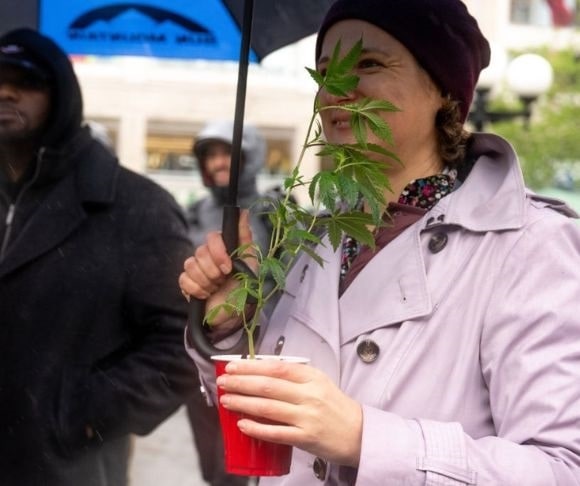
(Photo by Alexi Rosenfeld/Getty Images)
Is the federal government finally going to legalize marijuana? After years of promises from Democrats, Congress appears to be a step closer to lifting prohibitions on weed, but there are signs that this is not exactly a foregone conclusion when a significant number of lawmakers from both parties are not yet keen on the idea of marijuana legislation at the federal level. Many of the objections, in fact, are coming from Democrats who have been publicly championing the idea. Is it possible this bill is just another way to curry favor with the public to mitigate losses in the upcoming congressional elections?
 Senate Majority Leader Chuck Schumer (D-NY) recently filed the highly anticipated Cannabis Administration and Opportunity Act (CAOA) that, if passed, would decriminalize marijuana at the federal level. It would also allow states to determine how they regulate and legislate the use of the plant without federal interference.
Senate Majority Leader Chuck Schumer (D-NY) recently filed the highly anticipated Cannabis Administration and Opportunity Act (CAOA) that, if passed, would decriminalize marijuana at the federal level. It would also allow states to determine how they regulate and legislate the use of the plant without federal interference.
Schumer, along with Sens. Ron Wyden (D-OR) and Cory Booker (D-NJ) proposed the legislation over a year ago, according to Politico, which also noted that its “odds of passing in this Senate are slim” but that “the legislation will shape the conversation around cannabis legalization going forward.” It could influence elements of other legislative proposals that might have a better chance of passing.
The legislation has input from both Democrats and Republicans and would expunge the records of those convicted of federal marijuana-related crimes. It would fund law enforcement agencies’ efforts to curb the proliferation of illegal marijuana. The legislation would also create grant programs for small business owners from communities that have been disproportionately impacted by the “war on drugs.” This would ostensibly focus on black and Latino entrepreneurs.

(Photo by Alexi Rosenfeld/Getty Images)
The bill builds upon earlier proposals. It includes provisions related to cannabis industry workers’ rights, a nationwide impaired driving standard, and access to banking. Additionally, it would establish a new federal definition for hemp and would increase the permissible THC levels to a dry weight of 0.7%. Currently, the allowed level is 0.3%.
“For far too long, the federal prohibition on cannabis and the war on drugs has been a war on people, and particularly people of color,” Sen. Schumer said in a press release. He explained that the legislation “will be a catalyst for change by removing cannabis from the federal list of controlled substances, protecting public health and safety, and expunging the criminal records of those with low-level cannabis offenses, providing millions with a new lease on life.”
The federal government has been lagging behind the states when it comes to decriminalizing marijuana. Right now, 19 states have made it legal for people at least 21 years of age to use the drug while 37 have instituted medical marijuana programs. A Gallup poll conducted in November 2021 found that 68% of Americans support legalizing the drug.
Marijuana Legislation Just a Political Stunt?
However, there might be a snag. Democratic lawmakers from states in which marijuana has been legalized are not on board with making changes at the federal level. Politico reported:
“Democratic Sen. Jon Tester, for example, represents a state where weed is legal — Montana — and says he does not support federal decriminalization. A handful of other Democrats told POLITICO that they are against legalization or are undecided, including Sens. Jeanne Shaheen (D-N.H.), Joe Manchin (D-W.Va.) and Bob Casey (D-Pa.). Schumer would need all Democrats, plus ten Republicans, to get the bill over the finish line.”

Ed Perlmutter (Tom Williams/CQ-Roll Call, Inc via Getty Images)
Some Republicans are also not supporting the idea. They take issue with the provision that would expunge the records of those who committed cannabis-related crimes and its grant provisions for communities.
The House has also been working on its own proposed marijuana legislation. Last Thursday, the lower chamber passed provisions allowing cannabis companies to access banking services. However, even these might face a challenge. Rep. Ed Perlmutter (D-CO), who sponsored the provisions, urged the Senate to include them in its bill. “I’m calling on the Senate to take action for the safety of our communities and success of Veteran- and minority-owned businesses across the country,” he tweeted. “It’s time to get this done.”
Legalizing marijuana should seem like a near slam dunk, with most of the public supporting such a measure. Typically, it would be Republicans mounting the most vigorous opposition to this type of legislation. But the fact that Democrats are not as gung-ho as they have been in the past might be telling. With the party’s political fortunes in peril, this very well could just be a way to avoid a complete shellacking in November. The question is: Will it work or is this just another half-baked idea?
Remember to check out the web’s best conservative news aggregator
Whatfinger.com — the #1 Alternative to the Drudge


